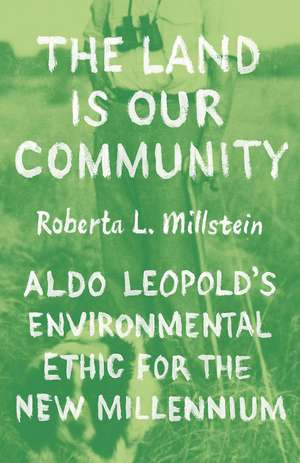The Land Is Our Community: Aldo Leopold’s Environmental Ethic for the New Millennium
Autor Professor Roberta L. Millsteinen Limba Engleză Paperback – 28 aug 2024
Informed by his experiences as a hunter, forester, wildlife manager, ecologist, conservationist, and professor, Aldo Leopold developed a view he called the land ethic. In a classic essay, published posthumously in A Sand County Almanac, Leopold advocated for an expansion of our ethical obligations beyond the purely human to include what he variously termed the “land community” or the “biotic community”—communities of interdependent humans, nonhuman animals, plants, soils, and waters, understood collectively. This philosophy has been extremely influential in environmental ethics as well as conservation biology and related fields.
Using an approach grounded in environmental ethics and the history and philosophy of science, Roberta L. Millstein reexamines Leopold’s land ethic in light of contemporary ecology. Despite the enormous influence of the land ethic, it has sometimes been dismissed as either empirically out of date or ethically flawed. Millstein argues that these dismissals are based on problematic readings of Leopold’s ideas. In this book, she provides new interpretations of the central concepts underlying the land ethic: interdependence, land community, and land health. She also offers a fresh take on of his argument for extending our ethics to include land communities as well as Leopold-inspired guidelines for how the land ethic can steer conservation and restoration policy.
| Toate formatele și edițiile | Preț | Express |
|---|---|---|
| Paperback (1) | 183.60 lei 3-5 săpt. | +9.96 lei 7-13 zile |
| University of Chicago Press – 28 aug 2024 | 183.60 lei 3-5 săpt. | +9.96 lei 7-13 zile |
| Hardback (1) | 669.42 lei 6-8 săpt. | |
| University of Chicago Press – 28 aug 2024 | 669.42 lei 6-8 săpt. |
Preț: 183.60 lei
Nou
Puncte Express: 275
Preț estimativ în valută:
35.14€ • 36.64$ • 29.20£
35.14€ • 36.64$ • 29.20£
Carte disponibilă
Livrare economică 27 februarie-13 martie
Livrare express 13-19 februarie pentru 19.95 lei
Preluare comenzi: 021 569.72.76
Specificații
ISBN-13: 9780226834481
ISBN-10: 0226834484
Pagini: 192
Ilustrații: 2 halftones, 1 tables
Dimensiuni: 152 x 229 x 18 mm
Greutate: 0.26 kg
Editura: University of Chicago Press
Colecția University of Chicago Press
ISBN-10: 0226834484
Pagini: 192
Ilustrații: 2 halftones, 1 tables
Dimensiuni: 152 x 229 x 18 mm
Greutate: 0.26 kg
Editura: University of Chicago Press
Colecția University of Chicago Press
Notă biografică
Roberta L. Millstein is professor emerit in the Department of Philosophy at the University of California, Davis.
Cuprins
Preface
Chapter One: Reinterpreting Leopold
Chapter Two: Interdependence
Chapter Three: Land Communities
Chapter Four: Land Health
Chapter Five: Arguing for the Land Ethic
Chapter Six: Policy Implications
References
Index
Chapter One: Reinterpreting Leopold
Chapter Two: Interdependence
Chapter Three: Land Communities
Chapter Four: Land Health
Chapter Five: Arguing for the Land Ethic
Chapter Six: Policy Implications
References
Index
Recenzii
“Millstein’s comprehensive but accessible work brings back to the present the importance of Aldo Leopold’s ‘land ethic.’ It functions as much more than a revisiting of his most famous work, A Sand County Almanac, but opens modern conservationism to the light of Leopold’s ideas and critique. This relatively short (but both broad and deep) work is a strong blend of environmental ethics, history and philosophy of biology. It demonstrates how Leopold’s land ethic is as relevant to our modern discussions around climate change, land use, biodiversity and evolutionary biology as it was originally.”
“Millstein’s book, The Land Is Our Community, offers a philosophical analysis that stimulates essential conversations among sectors committed to conservation about our ethical responsibilities with the environment. . . . This critical discussion must begin now, as we are at a pivotal moment in the environmental crisis. The Land Is Our Community can ignite the exchange of ideas and foster connections between science and philosophy.”
“‘What’s good is what’s good for the land.’ This formulation of Leopold’s packs so much into a single phrase. Millstein meditates on some of the aspects of that mighty slogan that are most pertinent to our time: the necessity of connection and care among all living beings, including the soil that sustains us, the return of the commons, and the power of community to resist extraction and create a civilization for the long haul. Millstein has actively engaged in local political struggles with significant success, and here she conveys some of her hard-won wisdom. This is a book that can be put to use. Leopold would like that.”
“As a philosopher of biology, Millstein brings a distinctive and valuable perspective to the interpretation of Aldo Leopold. Peppered with careful analysis of key concepts, The Land Is Our Community explores and defends the enduring relevance of Leopold’s land ethic.”
“In his influential 1949 essay ‘The Land Ethic,’ Aldo Leopold shared his view that a thorough philosophical reorientation was needed to ensure a healthy future for land and people. He also held that such an ethic of care had to evolve continually within an expansive ‘thinking community.’ In The Land is Our Community, Millstein brings fresh perspectives and ideas to this necessary conversation. She offers a clear-eyed reexamination of the foundations of the land ethic and well-grounded principles for its further evolution.”
